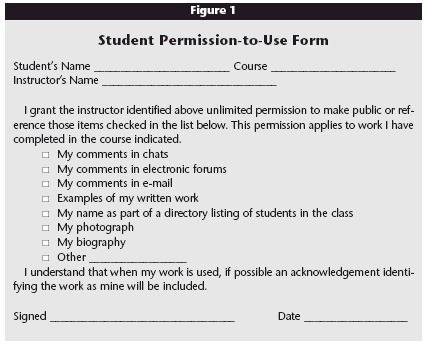Strategies for Establishing E-learning Policies
Posted by Malcolm Hays
In 2004, Educause Quarterly published an article on "The Importance of Policies in E-Learning Instruction" by Shirley Waterhouse and Rodney Rogers. This article is a very good overview of the issues that instructors need to think about when creating online courses. As with any course (traditional or new-fangled technological), it is important to establish from the beginning what your expectations are for your students and what the students can expect from you with regard to grading, homework, assignments, exams, privacy, communication, and so forth. In every class I’ve been in this information is presented in the syllabus.
Many courses on this campus are managed through Blackboard, which enables instructors to post all of the information necessary for the smooth running of a course–assignments, syllabus, supplemental readings, activities, quizzes, and more.
Waterhouse and Rogers provide some recommendations for disseminating the policies in an online course. For example, they have a sample email policy document that clearly delineates what email content is appropriate for the course and what is not and also when a student can expect a reply via email. Waterhouse and Rogers also suggest some alternatives to email communication. Blackboard does have a number of tools available for instructors: you can notify students of important information using the Announcements feature, you can set up discussion threads to discuss particular topics, you can also create blog and wiki entries (creating a blog or a wiki requires some configuration on your part since these features are "add-ons" that are not enabled by default).
Another issue that is critically important with regards to student-instructor interaction is how personal information about a student is handled in the online course (i.e. student privacy policies). Instructors probably shouldn’t release personal information about a student to other students in the class, even if only those students would have access to that information. If you plan to publicize a student’s work, either in or out of class, you should certainly obtain that student’s permission–even if you just want to show off a particularly good example of that student’s work to the rest of the class. Here is a good example of a form you might use to solicit students in what they consider acceptable use of their personal information.

It is also important to establish some policies for student codes of conduct, particularly if you will be encouraging students to engage each other in a discussion forum or other collaborative online social activity. If you read the comments in blogs or discussion forums in non-academic sites, sometimes the conversation can become a little heated, especially if the blog allows for anonymous comment posting (well, pseudo-anonymous, since the ISP hosting the blog can always track down a user via the IP they used to connect to the blog–this may be something to stress to students who work on projects outside of Blackboard. No one accessing the web is truly anonymous.).
Waterhouse and Rogers conclude their article with a comprehensive overview of fair use and DMCA, including a very nice checklist which contrasts activities that favor fair use (i.e. teaching, research, scholarship, etc.) against those activities that don’t (e.g. commercial activity, unpublished works, significantly large excerpts, etc.). Just in the past year, this campus has become much more aggressive about pursuing DMCA violations. The Student Affairs office and IT have teamed up to make students more aware of the potential consequences of a DMCA violation.